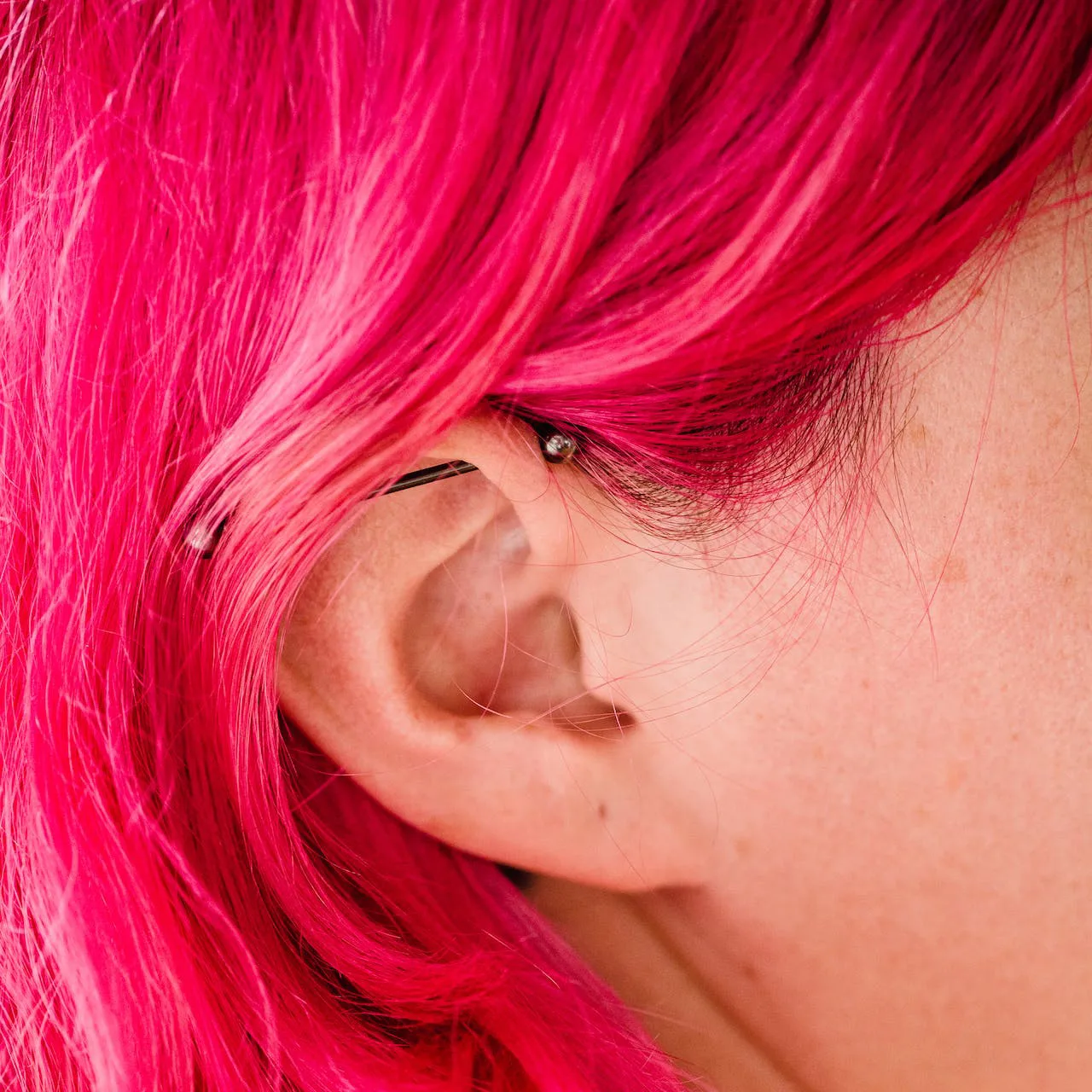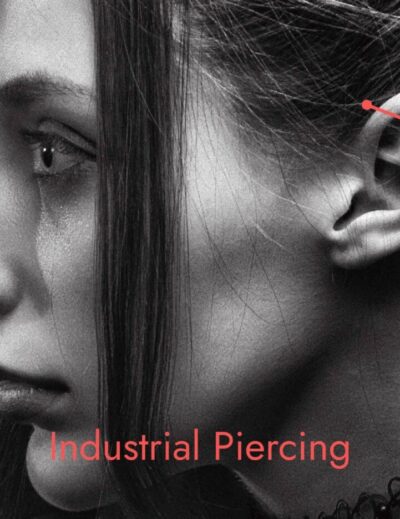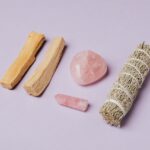
Industrial Piercing Pain: Does an Industrial Piercing Hurt?
Industrial piercings go through the upper portion of your ear and involve two holes. They’re commonly done with an industrial bar but can also be done with a chain, a rope, or two industrial studs.
They can be a very painful type of piercing and you may experience pain months, or even years after you get it.
Industrial Piercing Pain Scale 1-10: Does an Industrial Piercing Hurt?
Yes, industrial piercings hurt. Some say they are one of the most painful ear piercings because they involve two holes and because of their placement. On a pain scale of 1-10 with 1 being the least and 10 being the worst, many rate industrial piercings at around an 8 or a 9.
However, it truly depends on your pain tolerance.
Does a Septum Piercing Hurt Worse Than an Industrial Piercing?
According to people who have had both their septum and industrial pierced, industrial piercings hurt worse than septum piercings. However, this will depend on your own experience, body sensitivities, and pain tolerance.
How Long Does an Industrial Piercing Hurt?
Industrial piercings take around 6 to 9 months to fully heal and you may experience pain and throbbing for around 2 months. Again, it will vary based on the person.
When getting the piercing, if done by a qualified professional, it should be a sharp pinch that subsides quickly. After that, you may feel a dull ache or throbbing off and on for several weeks. While the piercing is still healing, it will likely hurt every time you touch it or bump it.

1. Why Does My Industrial Piercing Hurt After 2 Years?
If your industrial piercing still hurts after having it for two years, there is likely some type of complication. For example, the piercing could have become infected. This can happen when bacteria enter the piercing. It could happen naturally, due to poor cleaning, or because you reopened the wound by pulling or snagging the jewelry.
You could have also irritated the piercing when you changed your jewelry, if your hair got stuck in it, if you slept on it oddly, or if you switched to jewelry that you’re allergic to or that is low quality. Consider if there have been any changes with your piercing lately and seek professional advice if needed.
2. Why Does My Industrial Piercing Still Hurt After a Year?
For some people, industrial piercings take a whole year to fully heal. This could be because of your immune system, because there were complications with your piercing, or because you recovered from an infection.
Be sure you wait until the piercing is fully healed before changing the jewelry. Changing it out too quickly could also lead to pain and other problems.
3. Why Does My Industrial Piercing Hurt After 6 Months?
If your industrial piercing hurts after six months, it could be because it hasn’t fully healed. If the pain and soreness have been steadily improving and the piercing looks and feels healthy, it could simply need a little more time to heal.
If the soreness and pain have worsened and you see other symptoms like swelling, discharge, bleeding, unusual soreness, or you have a fever, your piercing could be infected. If that’s the case, you need to seek professional care and may need to take the piercing out.
Why Does My Industrial Piercing Hurt?
There are several different reasons why your industrial piercing could hurt. While it could simply need more time to heal, there are several other potential issues to consider. You may also want to reach out to your piercer for guidance.
1. Industrial Piercing Infection
Piercings are essentially wounds to your body that can get infected. Industrial piercings involve two holes, so your risk of infection is doubled. You can get an infection in just one of the piercing holes or both.
Signs of an industrial piercing infection include a foul odor at the piercing site, unusual swelling, and redness, feeling hot to the touch, a fever, discharge, bleeding, or unusual amounts of pain and soreness. Don’t delay seeking care and be sure to take infections seriously.
2. Industrial Piercing Irritation
Your industrial piercing may just hurt because it has become irritated. Upper ear piercings are susceptible to things like getting caught in your hair, rubbing up against pillows and blankets, snagging on a towel, or facing too much pressure if you sleep on that side.
3. Industrial Piercing Jewelry Issues
Your industrial piercing could feel uncomfortable if you have the wrong type of jewelry. For example, you may be allergic to the metal. Or, it could be ill-fitting, causing the earring to be too loose or too tight. Both circumstances can cause your ear to hurt.
Industrial Piercing Pain Relief
How to stop industrial piercing pain? If you’re experiencing pain, there are some things you can do to help seek relief.
1. Try to Identify the Source of Pain
First, try to figure out why the piercing hurts so much. This can help you decide what next steps to take. You may also consider reaching out to your piercer. They may want to take a look at the piercing to provide you with next steps.
2. Take Fever Reducers
If you’re able, and you may want to check with your doctor, you could take a fever reducer to help with the pain and soreness in your ear. If you have pain from an infection, you’ll likely need antibiotics and you may need to remove the piercing.
3. Clean the Piercing
From the day you get the piercing on, you should make sure it stays clean. Avoid touching or playing with the jewelry, and wash the piercing daily with a saline rinse. Be very careful when drying it to avoid snagging or pulling.
4. Apply a Cold Compress
Applying a cold compress, such as an ice pack or ice wrapped in a soft towel could help numb the area while also reducing redness and swelling.
How to Heal an Industrial Piercing Faster?
There are several steps you can take to help your industrial piercing heal as fast as possible.
1. Use Safe Materials

Industrial bar piercing cute with CZ stones gold and silver titanium 14G $19.9, SHOP NOW.
You’ll need to choose high-quality jewelry that you aren’t allergic to like K gold and implant-grade titanium. They are hypoallergenic and less likely to be rejected.
You should also ensure you get pierced by someone experienced and reliable who utilizes the right cleaning and sterilization procedures.
2. Clean Your Piercing Twice Per Day
Use a homemade saline solution or an antibacterial cleanser approved by your piercer each day and always wash your hands before touching it.
3. Avoid Touching the Piercing
If you introduce bacteria to the site, it may become infected, which may lengthen healing time. While the area may itch as it heals, do your best not to touch it. If you accidentally scratch it, rinse the area immediately with a sea salt solution.
4. Allow It to Fully Heal Before Changing the Jewelry
You must wait for an industrial piercing to heal completely before you try to change your jewelry.
A not-yet-healed piercing is prone to infection. Taking one piece of jewelry out and putting another in could introduce bacteria to the area. Plus, the trauma to the unhealed site may cause pain and bleeding.
5. Avoid Contact With Scented Soaps, Perfumes, Chemicals, and Other Chemicals
Protect it from cosmetics and hair products as they may cause an infection. If you plan to go to a hairstylist, tell them you have a fresh piercing so they can take precautions against touching it.
6. Avoid Using Headphones or Sleeping on the Ear You Had Pierced
Wear earphones instead of headphones to avoid applying unnecessary pressure on the piercings. Avoid sleeping on the recently pierced ear as this will also apply unnecessary pressure. It is recommended to not get both ears pierced at the same time.
While it can be challenging to sleep with a new industrial, place a clean t-shirt over your pillow so it does not get contaminated with bacteria while you sleep.
7. Watch for Signs of Infection
Finally, watch for signs of infection, such as swelling, tenderness, and pus drainage. If you notice any of these signs, contact your piercer immediately.
After you get your piercing, be sure to follow all instructions from your piercer.
Final Thoughts
If you have an industrial piercing and are experiencing pain and soreness, don’t get angry. Take action to figure out what could be happening. Then, take the right steps to seek relief. And remember, always reach out to a professional to avoid health risks and other complications.




